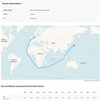The freight transport industry must collaborate to combat mounting congestion challenges and use a collective voice to move the issue up both public and governmental agendas, according to David Appleton, European Regional President for global container transport leader APL.
Speaking at the international transport conference, TOC Europe, in Istanbul, Mr Appleton said: “Unfortunately, supply chain congestion is not on many people’s radar screens. On the list of global issues, it does not rank very high.”
He emphasised the need to address this situation because of the strain on Europe’s transport infrastructure caused by the double-digit growth of imports to Europe, mainly from Asia.
“Forecasts for trade growth in the future show that congestion within the European supply chain will not be reduced. Serious constraints on trade and a slowing of global economic growth are very real consequences,” said Mr Appleton.
He stressed that the growth in trade, driven by consumer demand and the shift of production to lower cost locations such as Asia, has brought a strong response from transport providers. For example, shipping lines have invested on average Euros 9 billion per year over the past three years, with that figure estimated to increase to more than Euros 11 billion this year. Europe’s ports have also announced plans for new container terminal capacity costing more than Euros 6 billion within the past five years, explained Mr Appleton.
He highlighted the importance of ensuring that the general public and policy makers recognise and suport the efforts of the industry to move products quickly and efficiently and to overcome the threat of serious choke points caused by inadequate transport infrastructure – particularly on the landside.
He focused on the need to improve the planning process for new port development and a more integrated European rail system for freight movements.
In developing ports to better service the huge increases in imported goods, the transport industry as a whole must communicate its needs and the case for expansion more eloquently, said Mr Appleton.
He supported calls for the European Commission to bring clarity to the way in which planning decisions are made, and how sometimes conflicting plans for land resources are to be resolved, to convey greater certainty for port planners.
Mr Appleton applauded the ports of Rotterdam and Hamburg, which among others have made significant improvement to rail facilities and increased the proportion of containers moved to and from the ports by rail, which is a less environmentally damaging and potentially congestion-relieving mode.
But progress is slow. “The intermodal rail network is currently projected to handle only 15% of freight movements within Europe by 2020. And the prospect of a seamless rail system across Europe is difficult to envisage without an enormous political will,” said Mr Appleton.
Subscribe for
Maritime Reporter E-News
Maritime Reporter E-News is the maritime industry's largest circulation and most authoritative ENews Service, delivered to your Email five times per week










